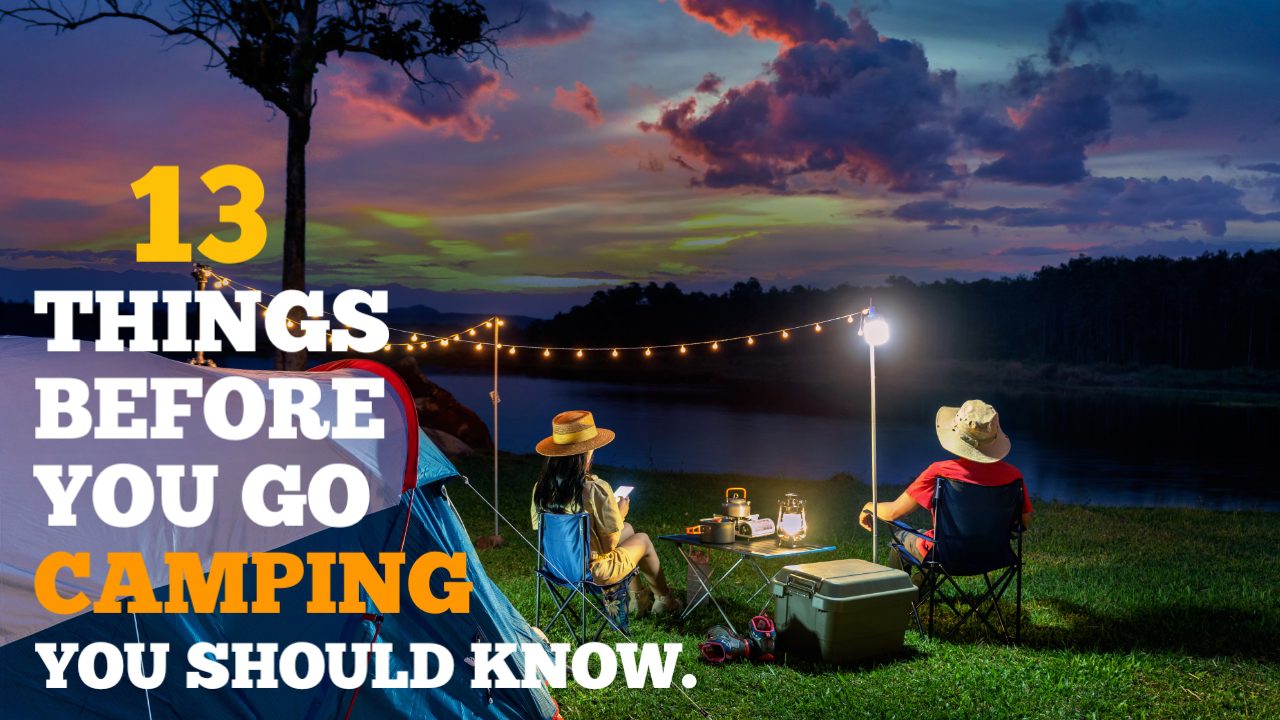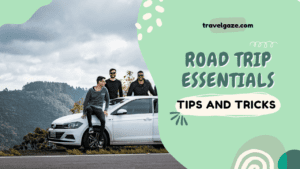An excellent approach to getting in touch with nature is to go camping. it makes lifelong memories with loved ones. It’s essential to be well-informed and organized to make the most of your camping vacation and guarantee a safe and pleasurable experience. In this blog, you get everything you need to know before going on camping.
1. Essential Camping Gear
Before you go out on your camping vacation, check that you have all the necessary things for a secure and enjoyable stay in nature.
- Tent Selection and Setup
Your tent will be your home away from home, so choose one that suits your needs regarding capacity, weather resistance, and ease of setup. Practice setting up your tent before your trip to avoid any surprises at the campsite. - Sleeping Bags and Pads
Spend money on top-notch sleeping bags and pads to keep warm and comfortable at night. How relaxed you feel in the morning can be significantly impacted by your choice of sleeping arrangements. - Camping Stove and Cookware
Pack a reliable camping stove and cookware to prepare delicious meals at the campsite. Go for lightweight and durable options that are easy to clean. - Lighting Solutions
Bring adequate lighting, such as headlamps, flashlights, or lanterns, to navigate your way around the campsite after dark. - First Aid Kit
A complete first-aid pack is essential. Bandages, antiseptic wipes, painkillers, tweezers, and other personal prescriptions you may need have to be included in it. - Multi-tool and Repair Kit
A multi-tool can come in handy for various tasks, from opening cans to repairing gear. Additionally, carry a small repair kit with essentials like duct tape and patching materials. - Navigation Tools
Have a map, compass, or GPS device along if you plan on exploring the outdoors.
Check camping gear here: https://www.decathlon.in
2. Clothing and Personal Items
Proper clothing and personal items are crucial for a comfortable camping experience, no matter the weather.
- Layering Clothing
Dress in layers to adapt to changing temperatures throughout the day. Avoid cotton and prioritize moisture-wicking and quick-drying fabrics. - Proper Footwear
To protect your feet while going outside, use durable, cozy shoes or hiking boots. - Rain Gear
Pack waterproof jackets and pants to stay dry during rainy weather. - Personal Hygiene Items
Supplies such as sustainable soap, toothbrushes, and toilet paper should always be available. - Sun Protection
Wear a hat, sunglasses, and sunscreen as sun protection precautions.
3. Choosing the Right Campsite
Selecting the right campsite can significantly impact your camping experience. Consider the following factors:
- Safety Considerations
Choose a campsite away from hazardous areas, such as cliffs or dead trees that could fall. - Access to Water and Resources
Ensure your campsite is close to a water source and offers access to firewood and other resources. - Distance from Wildlife
Keep a safe distance from wildlife habitats and potential animal trails. - Environmental Impact
Follow Leave No Trace principles and camp in areas that won’t harm the ecosystem.
4. Campfire Safety and Etiquette
Campfires can be an enjoyable part of camping, but they also require responsibility and consideration.
- Building and Extinguishing a Campfire
Follow local regulations and guidelines for building and putting out campfires. - Firewood Gathering Rules
Use only designated fire rings or pits and avoid collecting firewood from the surroundings. - Respecting Quiet Hours
Keep noise levels down during designated quiet hours to respect other campers.
5. Food and Meal Planning
Proper meal planning can make camping meals tasty and hassle-free.
- Packing Non-Perishable Foods
Bring nutritious food that needs minimum cooking and is simple to prepare. - Cooking at the Campsite
Utilize your camping stove or open fire to cook meals and heat water. - Storing Food Properly
Store food securely to prevent attracting wildlife to your campsite. - Disposing of Waste
Follow Leave No Trace principles and dispose of waste properly.
6. Dealing with Wildlife
While encountering wildlife can be thrilling, it’s crucial to do so responsibly and safely.
- Understanding Wildlife Behavior
Learn about the wildlife species in the area and how to behave around them. - Proper Food Storage
Keep food and scented items stored safely to avoid attracting animals. - Handling Encounters
If you encounter wildlife, maintain a safe distance and avoid feeding or approaching them.
7. Leave No Trace Principles
Adhering to Leave No Trace principles helps preserve the beauty of nature and ensures that future generations can enjoy the same wilderness you experience.
- Plan and Prepare
Research the area you’ll be camping in, check weather forecasts, and familiarize yourself with local regulations. - Travel and Camp on Durable Surfaces
Stick to established trails and camping areas to minimize your impact on delicate ecosystems. - Dispose of Waste Properly
Pack out all trash, leftover food, and litter, leaving no trace of your presence. - Leave What You Find
Avoid picking plants, disturbing wildlife, or leaving behind any unnatural objects. - Minimize Campfire Impact
Use established fire rings or camp stoves to reduce the impact on the surrounding environment. - Respect Wildlife
Observe animals from a distance and never approach or feed them. - Be Considerate of Other Visitors
Keep noise levels down and respect the privacy of other campers.
8. Weather Awareness
Camping involves being exposed to the elements, so staying informed about weather conditions is essential.
- Checking Weather Forecasts
Before heading out, check weather forecasts for your camping location. - Preparing for Different Weather Conditions
Pack appropriate clothing and gear for varying weather scenarios. - Sheltering from Extreme Weather
Know where to find shelter in case of sudden weather changes or storms.
9. Camping with Children and Pets
Camping with kids and pets can be a rewarding experience with proper preparation.
- Ensuring Safety and Comfort
Prioritize safety measures for children and ensure they have proper gear and clothing. - Keeping Kids Engaged
Plan fun activities for kids to keep them engaged and entertained. - Pet-Friendly Camping Tips
Follow campground rules regarding pets and ensure they are comfortable and secure during the trip.
10. Emergency Preparedness
Even with thorough planning, emergencies can happen, so it’s essential to be prepared.
- Communication Devices
Carry a fully charged mobile phone or consider bringing a satellite phone for remote areas. - Informing Others of Your Plans
Share your camping itinerary with friends or family and inform them of your expected return date. - Basic First Aid Tips
Learn basic first aid skills and carry a comprehensive first aid kit.
11. Responsible Camping Practices
Being a responsible camper ensures that you leave the campsite and natural surroundings in excellent condition.
- Reducing Noise Pollution
Keep noise levels down, especially during quiet hours, to respect other campers’ tranquility. - Keeping the Campsite Clean
Clean up after yourself and leave the campsite as you found it. - Adhering to Campground Rules
Follow all campground rules and regulations to maintain a harmonious camping environment.
12. Fun and Recreational Activities
Camping offers numerous opportunities for adventure and relaxation amidst nature.
- Hiking and Nature Walks
Enjoy the beauty of the outdoors through hiking and nature walks. - Wildlife Observation
Observe wildlife from a safe distance and appreciate their natural behaviors. - Campfire Stories and Songs
Gather around the campfire and share stories or sing songs for a memorable evening.
13. Common Mistakes to Avoid
Being aware of common camping mistakes can help you have a smoother camping experience.
- Overpacking
Pack only the essentials and avoid bringing unnecessary items. - Ignoring Campground Rules
Respect campground rules and guidelines to ensure a pleasant stay. - Leaving Trash Behind
Always clean up after yourself and dispose of trash properly. - Not Testing Gear Beforehand
Test your camping gear before the trip to avoid last-minute issues.
Conclusion
Finally, going camping is a great opportunity to unwind, connect with nature, and make treasured memories. By preparing adequately, following responsible practices, and respecting the environment and others, you can make the most of your camping adventure. Embrace the great outdoors, cherish the simplicity of camping life, and leave no trace behind, ensuring that nature remains pristine for generations to come.





Pingback: 101 Ways to Travel on a Budget (2023) - TravelGaze
Pingback: Rishikesh for the first timer: A beginner's guide 2023 - TravelGaze
Pingback: The Ultimate Guide to Camping: 10 Tips for Young Adventurers - TravelGaze